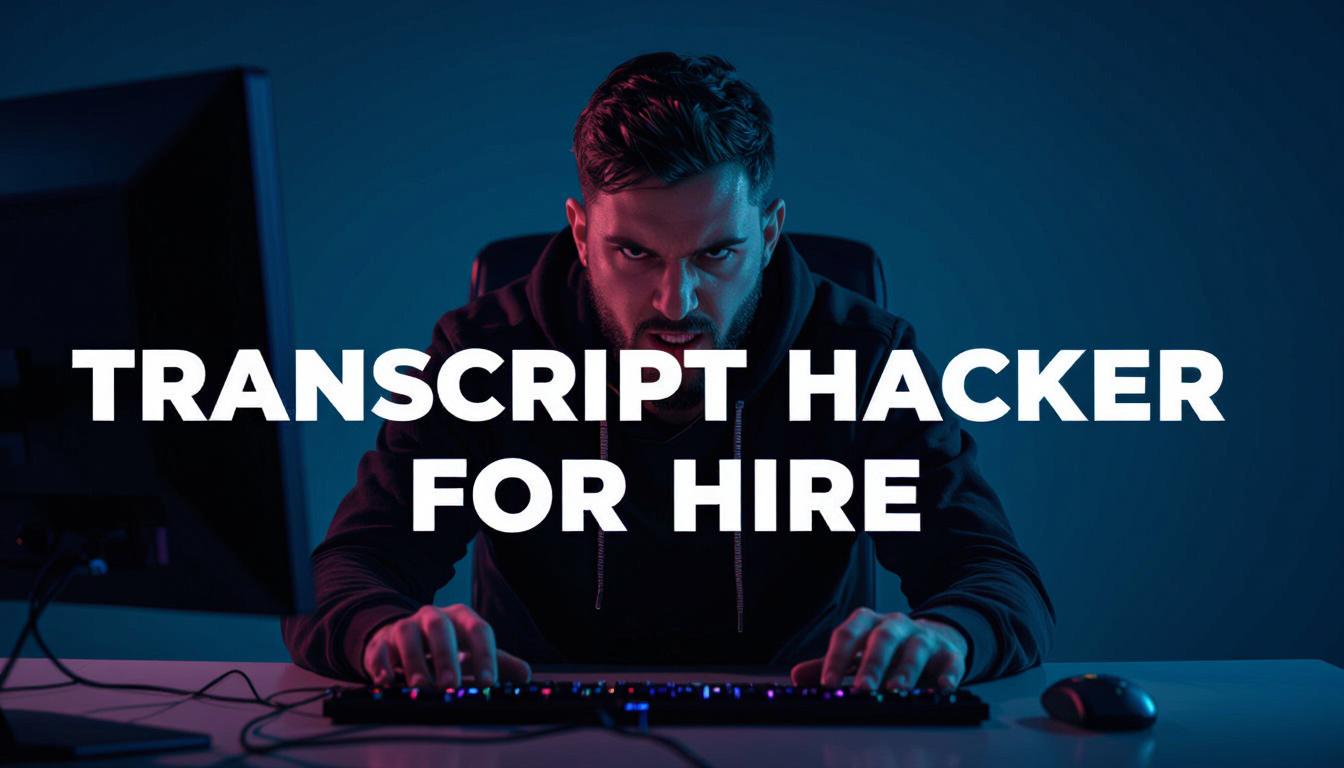Transcript Hackers for Hire: What You Should Know
Table of Contents
- Introduction: The Allure of the Quick Fix
- What a Transcript Hacker for Hire Really Does
- Common Myths That Keep the Market Alive
- Methods Hackers Use — and Why They’re Not Foolproof
- Spotting Scams in the “Best Hackers for Transcript Modifications” Space
- Legal and Ethical Landmines
- Risks Beyond the Obvious
- Real-World Case Snapshots
- Trusted Services for Transcript Grade Changes — Reality Check
- Safer, Legal Alternatives
- Conclusion: The Smart Play
1. Introduction: The Allure of the Quick Fix

Transcript hacker for hire — the phrase has a certain dangerous appeal. For students on the brink of losing scholarships, or professionals whose job prospects hinge on a spotless record, it promises a shortcut. Online ads make it look simple: pay a fee, get discreet service, walk away with a new GPA.
I’ve followed this trail for years — from underground forums to encrypted chats. What I’ve seen? A market saturated with scammers, a handful of technically skilled operators, and plenty of people left worse off than when they started. The reality is far more tangled than the sales pitch.
2. What a Transcript Hacker for Hire Really Does
Strip away the mystery, and the job is about gaining access to academic systems — whether that’s a university’s student information system (SIS) or a school’s internal database.
Some market themselves as the best hackers for transcript modifications, showing off “before and after” screenshots. But many are middlemen who outsource the work to unknown technicians. The real technical process — when it actually happens — might involve phishing administrators, exploiting unpatched software, or persuading an insider to make edits.
3. Common Myths That Keep the Market Alive
Myth 1: Schools use outdated systems that are easy to hack.
Reality: Many now use enterprise-level security with multi-factor authentication and intrusion detection.
Myth 2: You can a hacker edit academic transcripts legally if it’s “just correcting mistakes.”
Reality: Without institutional authorization, it’s still illegal.
Myth 3: Payment guarantees results.
Reality: Scammers take money and vanish, or deliver nothing but doctored PDFs.
4. Methods Hackers Use — and Why They’re Not Foolproof
The primary approaches include:
- Credential theft via phishing or social engineering.
- Exploiting software flaws in web portals or back-end systems.
- Insider collusion with staff who have legitimate access.
Even when successful, edits can be flagged during audits or data migrations. Most institutions keep backups, so unless all instances are modified, discrepancies can surface later.
5. Spotting Scams in the “Best Hackers for Transcript Modifications” Space
This niche is dominated by fraud. Red flags include:
- Demands for full payment upfront via crypto.
- No verifiable record of success.
- Refusal to explain their process in even general terms.
Occasionally, a figure emerges with underground credibility. One such case is a known transcript hacker for hire mentioned in certain closed circles. But even then, you’re still exposed to legal, financial, and reputational risk.
6. Legal and Ethical Landmines
Consequences can include:
- Expulsion from school.
- Criminal prosecution with fines or prison time.
- Revocation of degrees, even years later.
For example, the Wired Guideline treats unauthorized access to educational data as a serious offense, with enforcement measures that can cross borders.
7. Risks Beyond the Obvious
It’s not just about getting caught in the act. Other dangers include:
- Financial loss from paying a scammer.
- Identity theft if you hand over personal details.
- Blackmail using proof of your request to pressure you later.
8. Real-World Case Snapshots
Case 1:
In 2020, a graduate student in Canada paid $3,500 to a self-described “academic systems specialist.” The hacker delivered a revised transcript — but it was a fake PDF. When the student tried to use it for a job application, the employer verified directly with the university, exposing the fraud.
Case 2:
In 2017, two undergraduates in Florida bribed a part-time IT contractor to alter their grades in the school database. Changes went unnoticed for a semester. During a system upgrade, mismatches between backups and live records revealed the edits. Both students were expelled; the contractor faced felony charges.
9. Trusted Services for Transcript Grade Changes — Reality Check
The idea of “trusted” actors in this black-market space is mostly an illusion. Reputation systems on underground forums can be faked. Reviews can be bought.
Even a genuinely skilled operator may decide betrayal is more profitable than loyalty. Trust, here, is conditional — and it ends the moment leverage shifts.
10. Safer, Legal Alternatives
- File a formal grade appeal.
- Request an official review for administrative errors.
- Retake courses or negotiate extra credit with professors.
11. Conclusion: The Smart Play
After years of covering cybercrime, I’ve seen the pattern: the quick fix rarely stays fixed. Even if you succeed in hiring someone to hire a hacker to change transcripts, the change leaves a trail — sometimes digital, sometimes human — that can resurface years later.
